Researchers need all of us to finally solve the PF puzzle.


























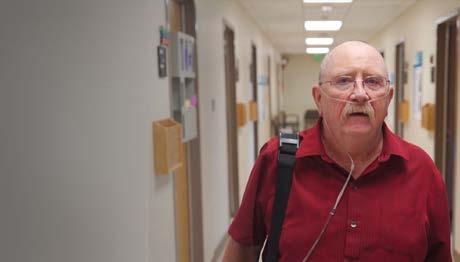














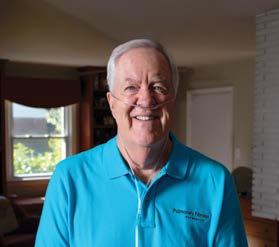




Annual Report
from the Community
2023
Voices
DEAR FRIENDS,
Now that we have the PFF Community Registry up and running and able to accept participants from throughout the pulmonary fibrosis (PF) community, it seems like a good time to share my family’s PF story.
I had already been working at the PFF for three years when my adoptive mother was diagnosed with idiopathic pulmonary fibrosis (IPF) in 2014. She required supplemental oxygen almost immediately.
A few months after diagnosis, my mother developed pneumonia and was hospitalized. She had an acute exacerbation several months later, after which she started hospice care. In all, my mother had only 14 months from diagnosis to the time she died.
The sense of shock and disbelief I felt at her diagnosis and rapid decline is echoed in other PF families every day. There’s no other way to put it: Learning that you or a loved one has PF or other interstitial lung disease (ILD) is a shock.
Every family’s story is unique, but they all have one thing in common: researchers can learn from it. Whether you’re a patient, a biological family member, a caregiver, or a lung transplant recipient who had PF or ILD, your participation in the PFF Community Registry can help scientists gain a new understanding of these diseases. That’s why I joined as a caregiver and have already completed a six-month follow-up survey.
Enrollment is free, easy, and secure. If you haven’t yet enrolled, please join us today. If you have enrolled, please be sure to complete your follow-up survey promptly every six months when you receive it.
Finally, I’d like to close by recognizing the memory of one of the PFF’s co-founders, Daniel Rose, MD, who passed away in July. We in the PF community have benefitted greatly from Dan’s drive and vision. Much of what we do today, including the PFF Registry, began as his idea. Read more about Dan’s impact on page 17. He will be missed.

Sincerely,
 SCOTT STASZAK Chief Operating Officer
SCOTT STASZAK Chief Operating Officer

Community Voices, Community Choices

The Pulmonary Fibrosis Foundation (PFF) is bringing together a community of everyone affected by PF and other ILDs. This community includes patients, caregivers, family members, lung transplant recipients, health care professionals, researchers, industry partners, and others.
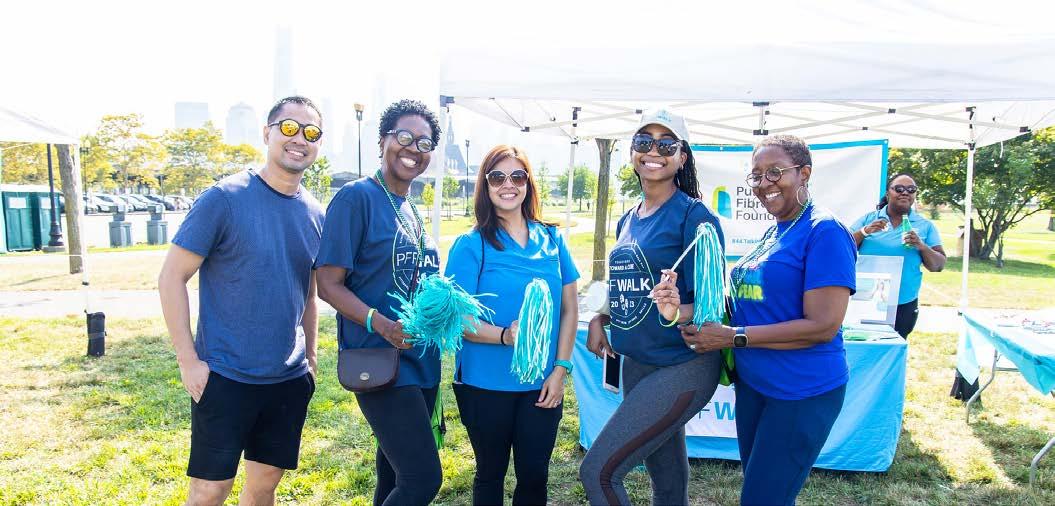
We are building this community because strength in numbers—and strength in focus—is the best way to reach our ultimate goal: Learning how to better diagnose, treat, and potentially cure PF and ILD.
We now have a powerful tool to help us reach our goals: the PFF Community Registry. This unparalleled nationwide research program is a crucial step forward for the PF/ILD community. The PFF Community Registry welcomes everyone affected by these diseases to sign up and contribute data to scientific research.

For the first time, people who join the Registry can directly tell researchers about how living with PF and ILD affects their lives.
Make the choice to use your voice to fight PF and ILD.
Sign up for the PFF Community Registry today at pffregistry.org .
I joined the Community Registry because I wanted to supply any information from my journey to help others struggling with PF and encourage them to keep up their faith and be strong.
Alejandro “Alex” Puebla Zeeland, Michigan Lung Transplant Recipient
3
Who Can Join the PFF Community Registry? You Can!
Everyone affected by PF and ILD should join the PFF Community Registry! You can join the Registry if you fall into one or more of these categories:
PATIENT DIAGNOSED WITH PF OR ILD.

“Pulmonary fibrosis research like the Community Registry is important because it helps save people’s lives. PF is a scary disease and I hope that this research will help keep people from dying in the future.”
Kevin Rotunda

Yemassee, South Carolina
Patient Living with PF
LUNG TRANSPLANT RECIPIENT WHO HAS HAD PF OR ILD.
“The Community Registry will help improve medications and treatments that could benefit people like me. Researchers need to hear our voices and learn about our journeys in order to help us and others.”
Terri Pilawa

El Monte, California Lung Transplant Recipient

CAREGIVER AND/OR BIOLOGICAL FAMILY MEMBER (parent, child, full/half sibling) of patient with PF or ILD, including those who have passed away.
“Initially, I didn’t think I had a reason to join the Registry because my father had already died, but then I understood that it’s imperative for the entire community to be involved long-term to have positive impact.”
Lisa Boyd Chicago
Child and Former Caregiver of Patient with IPF
Caregivers and family members who have lost a loved one to PF or ILD are invited to participate. Your valuable insights will help medical research. Registry participants must be 18 or older and live in the U.S.
4
Help Change the Future of PF and ILD

The more people who participate in the PFF Community Registry, the more everyone benefits. And those benefits will only increase over time, as more people complete more six-month follow-up surveys. The more data in the Registry, the more questions researchers can answer.
The true value of the PFF Community Registry is that it lets researchers look at changes over time among the same group of participants. Staying current by completing follow-up surveys every six months is the best thing you can do to help the Registry succeed.
We need your continued participation!
Sign up Complete baseline survey Complete study-specific surveys as needed Complete follow-up survey PFF
Researchers
3 2 1 4 5
5
shares research results with PFF Registry members
use Registry data to conduct studies
6 Close the circle. Join the Registry today.
Who’s Who in the PFF Community Registry
Participants’ Enrollment Status

Of the 1,600+ participants: Nearly 40% of participants are biological relatives of or caregivers to patients. This diversity will add important insights to what we learn about how PF and ILD affect the entire community, not
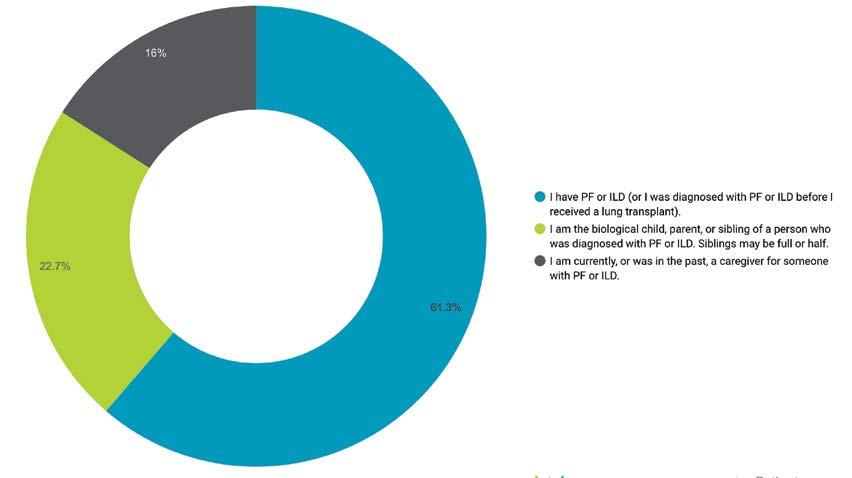
I have PF or ILD (or I was diagnosed with PF or ILD before I received a lung transplant).
I am the biological child, parent, or sibling of a person who was diagnosed with PF or ILD.
I am currently, or was in the past, a caregiver for
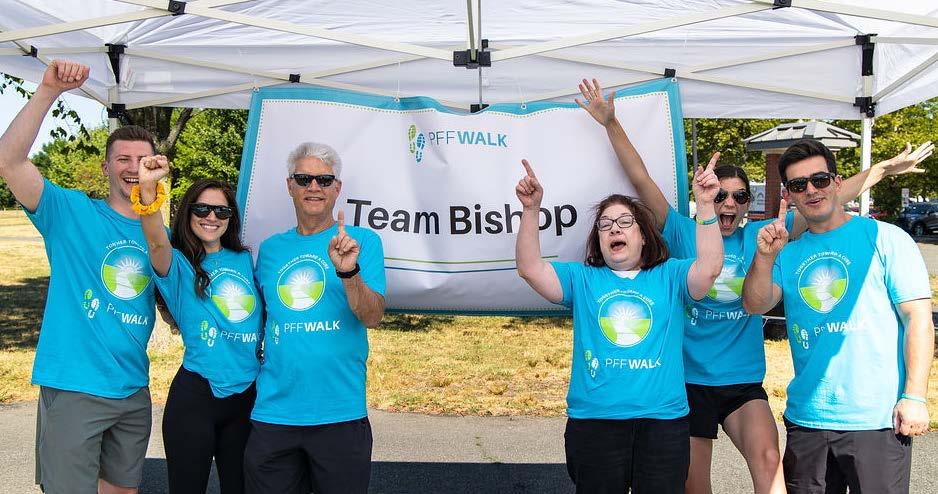
16% 61.3% 22.7% 6
1,600+ Participants and Growing
Participant Demographics
Currently, just under 10% of participants identify as belonging to minority races, and 4% are Hispanic or Latino. This does not reflect what care teams see in their clinics every day, so we have an important opportunity. If more minorities join the Registry, that will help researchers better understand what people of all backgrounds with PF or ILD experience.
Were you aware of PF before your diagnosis?
Three out of four patient participants either had never heard of PF before their diagnosis (61%) or didn’t really know much about it (16%). The more the PFF can get the word out, the more people we can help.
Do you or did you attend
health care appointments with
this person?
Half of participants who are caregivers always attend health care appointments with the patient, and 41% attend most or some of the time. We look forward to learning more about this commitment as the Registry data become more mature.

7
Make your voice heard by joining the PFF Community Registry today. It’s easy and benefits everyone.
Registry Q&A with Dr. Kevin Flaherty
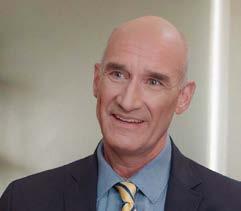
If you had one-on-one time with a leading PF and ILD researcher, what would you ask? IPF patient Karen Smoot of Albuquerque, New Mexico, had the chance to interview Kevin R. Flaherty, MD, MS, Chair of the PFF Registry Steering Committee recently. Here’s a snapshot of their conversation.
Why should people join the PFF Community Registry?
Fibrotic lung diseases are a devastating group of disorders. We need new and better therapies, and the only way to get them is by doing more research. Our community can help us by entering their data twice per year to help us understand the true impact of these diseases across the country.
How does the PFF Community Registry compare with the previous PFF Patient Registry?
The previous PFF Patient Registry enrolled only patients at one of the PFF Care Center Network hospitals. Enrollment was capped at 2,000 patients. The Community Registry does not have an enrollment cap and participants can live and get care anywhere in the United States.
And now, for the first time, the PFF can communicate directly with Community Registry participants who have told us they want to learn about additional research opportunities. Being able to communicate with participants will make the registry more nimble as new research questions come up.
What has been the PF community’s response to the Community Registry?

We’re pleased with our initial enrollment, because 1,600 participants will generate a lot of data. But when you think that fibrotic lung disease affects many hundreds of thousands of people, we’re still just a tiny fraction of what we could be.
We must do more to get the word out and help people enroll when they have questions about the process.
Is there anything that has surprised you about the data or response to the Registry?
A year may seem like a long time, but we’re really just getting started. We’ve learned that we can get many people to enroll quickly, but then it takes several years of collecting data before we can use the Registry to conduct good studies. That can be frustrating to people but, unfortunately, medical research doesn’t move quickly. We want to help people understand that doing many repeat surveys is what will help us find answers eventually.
What is your hope for the Registry in five years? Ten years?
The biggest value to researchers will be seeing how answers change—or don’t change—over time. So even if your answers don’t change much between six-month surveys, they’re still vital information. Once we have thousands of engaged participants completing each survey, we’ll be able to conduct new research to find answers very quickly. At that point, it will be like having an army of people for pulmonary fibrosis. Participants will be ready to be called up, like the Army Reserve, so we can mobilize them very quickly to answer researchers’ questions. That’s how real change will come.
Karen Smoot, who has been living with IPF since 2011, is a PFF support group leader.

8
What Can You Do?


Get updates, including monthly emails and biannual newsletters Your actions can make a world of difference towards a world without pulmonary fibrosis!
Kirton
Virginia
Transplant
1 2
3 Visit the PFF Registry website and click “ Join the PFFCommunity Registry” Complete Screening and Informed Consent Forms, plus your enrollment survey, via secure online portal Complete follow-up surveys every six months, plus optional substudies
2
5 3 Spread the word: Patients,
transplant recipients,
join! 9
It is important for participants to continue taking follow-up surveys because we’re not taking a snapshot of a moment in time, we’re building a photo album. That means we must continue adding snapshots to make the story complete. Sam
Mineral,
Lung
Recipient
4 5
1
4
lung
caregivers, and family members can
Focus on Familial PF

When brothers Tom and Sean Tully learned that multiple people across two generations of their family had familial pulmonary fibrosis (FPF), they knew they had to address the heart of the issue: scientists don’t yet know enough about pulmonary fibrosis.
Their solution: provide research funding for scientists whose work approached the problem of FPF in creative and promising ways. To date, the brothers have donated $750,000 to fund FPF research in a combination of direct grants to leading researchers and grants to the PFF to fund the Tully Family Familial Pulmonary Fibrosis (FPF) Research Awards.
Not everyone can make the personal commitment to funding research that we have, but everyone in the PF community can join the Community Registry. We can’t do the research we need without enough raw data. The more data we have, the more effective research will be. That’s where you come in.
Sean Tully New Hope, Pennsylvania FPF Philanthropist

The PFF and the people in the Registry are very important, because we need to speak with a shared voice to raise awareness of PF and motivate the pharmaceutical industry and others to do much more research into fibrotic lung disease.
Tom Tully
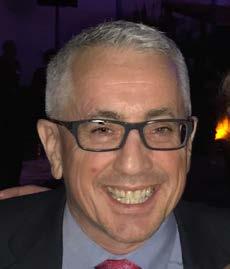 Pleasant Valley, New York
Patient with FPF PFF Ambassador
Pleasant Valley, New York
Patient with FPF PFF Ambassador
10
Here’s what some of the grantees have to say about their research:

In my lab, we work with mice and cell-based modeling, and we use mutations responsible for FPF to identify cell signaling pathways activated in the lung that drive lung fibrosis. Our hypothesis is this is how the disease begins. It gives us an understanding of the vulnerabilities we can target for interventions. Compared to current drugs for PF, we’re targeting higher up in the disease pathway. Our goal is to better deliver treatment to the target cells without systemic toxicities that limit most drugs.
Jeremy Katzen, MD, University of Pennsylvania

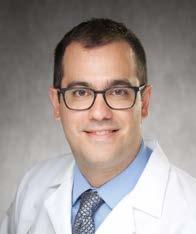
My lab studies the role that the epithelial cells lining our airways play in initiating or maintaining chronic inflammation and fibrosis in lung disease. Lung fibrosis is one of the biggest biomedical challenges of our times; as a clinician, I’m frustrated by the lack of new treatments for lung fibrosis. However, as a scientist, I’m excited to take on the challenge. People with FPF are key drivers of progress by contributing their knowledge, advocacy and by supporting and participating in research. We need to have the right data to come up with the best ideas for research; registries enable data analysis at large scale and are a great complement to other modalities of data collection.
Alejandro A. Pezzulo, MD, University of Iowa
FPF can be caused by harmful variants in multiple genes. Modern science is getting more sophisticated at identifying these variants and using them to predict risk of pulmonary fibrosis, whether there is a family history of disease or not. We estimate that 20% to 30% of FPF cases will have a harmful rare genetic variant in one of several different telomere-related genes and that 1% to 3% of FPF cases will have a harmful genetic variant in one of the surfactant genes. As this is a rapidly evolving field, we expect that genetic testing will play an ever-increasing role in the clinical management of patients in the future.
Christine Garcia, MD, PhD, Columbia University

11
How the Community Registry Can Help in the Fight Against PF

The PFF Community Registry aims to make positive contributions in several key areas that affect the PF community. These include:
Research - Data from the Registry can be used as the basis of studies that will ultimately be published in peer-reviewed medical journals. This is how scientific and clinical advances become widely accepted over time.
Clinical Trials – It often takes years to recruit enough patients to run a clinical trial. The Registry will speed up that process by connecting interested participants with open clinical trials to shorten recruiting timelines.

Clinical Practice - What we learn from Registry participants can be used to create PFF Position Statements. These documents help guide clinicians with the goal of improving health care delivery methods for all patients with PF and ILD.
Education – One of the PFF’s most important goals is to always be the trusted resource for reliable information about PF and ILD. Over time, we will use what we learn from the Community Registry to create new educational resources for patients and families.
Advocacy – The PFF maintains a robust advocacy program to educate public officials about issues that affect people with PF and their families. We will use what we learn from the Community Registry to inform our advocacy efforts to improve the lives of people with PF.
12
A Tool for Supplemental Oxygen Advocacy

To show how Registry data may benefit the PF community in the future, let’s look at the issue of supplemental oxygen.
We know that access to supplemental oxygen is a top issue in the PF community and that too many people can’t get the supplemental oxygen they need. One of PFF’s top priorities is lobbying members of Congress to help ensure that people who require supplemental oxygen have access to medically appropriate oxygen.
The PFF currently shares an information sheet that reports that approximately 50% of people living with PF who use supplemental oxygen report having problems with their oxygen. Although that is the best statistic currently available, it comes from a survey of people with PF that was published in 2018.
The PFF hopes to eventually provide updated and more detailed information about this allimportant topic to policymakers using the Community Registry.
Learning More About Supplemental
According to PFF Senior Medical Advisor of Research, Joseph Lasky, MD, here’s how that might play out in the future:
“Right now, our surveys ask for only basic information about patients and supplemental oxygen. But we or outside researchers could refine that information in the future by sending willing participants an additional survey specifically about their experiences with supplemental oxygen.
“Once we received enough responses to that questionnaire, the PFF could then use that new data to lobby Congress. We could provide detailed, up-to-date information not available anywhere else about what patients experience and their oxygen-related challenges. Having this information from the Registry could create positive change for everyone over time.”
Oxygen

ARE YOU USING SUPPLEMENTAL OXYGEN?
Four out of five (80%) of patients in the Registry use supplemental oxygen, while 20% do not. We have a great need for more data about the experiences of people with PF and ILD who require supplemental oxygen.

13
Research Update from the PFF Patient Registry
Data collection has ended for the PFF Patient Registry, which includes data and biosamples from 2,000 patients with ILD at PFF Care Center Network hospitals. But new studies based on data from the Patient Registry continue to be shared with the scientific community.

For example, the 2023 American Thoracic Society’s annual meeting featured a number of studies that used data from the PFF Patient Registry, including:
Rural Versus Urban Disparities in Access to Care and Treatment of Interstitial Lung Disease: An Analysis of the Pulmonary Fibrosis Foundation Patient Registry (poster by R. Boente and others).
Summary: Data from the PFF Patient Registry suggest that disparities in access to care exist for ILD patients in rural areas. However, these disparities did not lead to more frequent hospitalizations or emergency department visits. Larger studies with more rural-inclusive databases are needed to better understand disparities and how to improve access to care for rural patients living with ILD.
Summary: An analysis using PFF Patient Registry data identified several differences between patients who remained on antifibrotic therapy and those who discontinued treatment. Understanding the characteristics of patients living with IPF who continue therapy in a real-world setting may help guide physicians in their shared decision making and support for patients on these therapies.
Looking for the Crystal Ball: Biomarkers to Predict Disease Progression and Mortality in ILD (poster by J. Oldham and others).
Summary: The authors used PFF Patient Registry data to assist with identifying serum protein biomarkers associated with survival among patients with IPF. They identified more than 200 biomarkers, including many that were previously unknown and may contribute to IPF progression. Additional research is needed to learn how each protein affects IPF progression, and whether any may serve as new treatment targets.
Leveraging Imaging and Biosamples to Improve Diagnosis and Risk Prediction in ILA
and ILD (poster by J. Oldham and others).
with Persistence with Antifibrotic Therapy in
Factors Associated

Patients with IPF Enrolled in the PFF Patient Registry (poster by T. Kulkarni and others).
Summary: The authors used PFF Patient Registry data to help discover and validate a proteomic signature to identify patients who may have rapidly progressing IPF. These findings suggest that a blood test could help to identify patients who may benefit from early transplant referral.
14
PRECISIONS Study Continues Enrollment
PRECISIONS is a multicenter clinical trial that relies on PFF Patient Registry data and biosamples. In one of the largest-ever governmental grants for PF-related research, PRECISIONS has received $22 million in funding from the National Heart, Lung, and Blood Institute (NHLBI) and the Three Lakes Foundation.
By converting all the biosamples into omics data using whole genome sequencing, PRECISIONS hopes to identify genetic variants that affect a person’s risk of developing IPF. PRECISIONS also studies whether the over-the-counter supplement N-acetylcysteine (NAC) can treat people with IPF who have a specific gene variant.


Co-principal investigator Imre Noth, MD, of the University of Virginia and UVA Health, reports that
PRECISIONS expects to reach full enrollment by early 2024. “The trial will be complete two years after we enroll the last patient,” he says. “Due to the Covid pandemic, NHLBI has given us a oneyear extension and we are hitting all our milestones on the new timeline.”
The study’s Data Safety Monitoring Board reviewed interim data recently, with good news: “They told us that we’ll be able to achieve our trial objectives based on our data,” Noth says. “We still don’t know what our final results will be, of course, but we’re extremely pleased to have reached this milestone.”
The PRECISIONS team presented an abstract at the 2023 American Thoracic Society’s annual meeting and currently has a full-length paper under review at a medical journal.
When I completed my training in 1999, there were no drugs and no clinical trials for PF. Now there are dozens of clinical trials every year and we have two drugs on the market. We were able to make that kind of progress because thousands of patients generously participated in research.
Imre Noth, MD University of Virginia and UVA Health
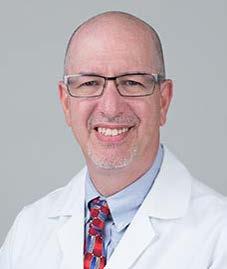
15
The Importance of Philanthropy
The PFF has been fortunate to receive many large donations from a variety of family foundations and other types of donors to fund the PFF Registry and other research initiatives. But not everyone has the means to offer this level of financial support.
Thank You to Our Lead Sponsors
Everyone can make a difference, though. The PFF gratefully welcomes financial donations of any size to support the PFF Registry. Donating is easy.
Make your secure donation today.
The PFF forges meaningful collaborations with the nation’s top industry partners, research institutions, and government agencies with the shared goal of finding a cure for PF and ILD.
The PFF would like to recognize the most generous supporters of the PFF Registry, including:
• Genentech, a member of the Roche Group Founding Partner
• United Therapeutics Visionary Partner
• Boehringer Ingelheim

Sustaining Partner
Thank you to the many industry partners, foundations, and individual donors who have supported the PFF Registry.
Contact Jennifer Mefford, PFF Vice President, Corporate Partnerships, to discuss corporate sponsorships of the PFF Registry at jmefford@pulmonaryfibrosis.org.

Individual philanthropy helps shine a light on areas of urgent research needs that may be under-addressed by current funding mechanisms.
Christine Garcia, MD, PhD Director of the Columbia Precision Medicine Initiative Columbia University
16
PFF REGISTRY DONORS*
InterMune, Inc.

Mr. and Mrs. Chuck and Monica McQuaid
The Cowlin Family Fund
Peter L. O’Neill Memorial Fund
Three Lakes Foundation
Rattner Family Foundation, Inc.
Biogen, Inc.
Ms. Nelda Hagaman
The Hastings Foundation
The Buckeye Foundation
The Hales Family Foundation, Inc.
Mrs. Sally Willis
The Goldhirsh-Yellin Foundation
Mr. and Mrs. Fred and Virginia Krauss
Steffy Family Foundation Fund
2015 Hike Around Mont Blanc Rouine Run
* Donor List of $5,000+ as of October 31, 2022
PFF Registry: In Memoriam Daniel Rose, MD
Michael P. Savoca Memorial Foundation
2013 Pete DeVito Memorial Foundation Golf Outing
Mr. and Mrs. Paul and Susan Bergna
Bristol-Myers Squibb
Mr. Mike Henderson
G. Johanneson Family Foundation
Stoelting Co.
Mr. Bill Amick
Minnesota Pulmonary Fibrosis Support Group
The PFF mourns the passing of PFF co-founder Daniel “Dan” Rose, MD. Dan and his family channeled the pain of three PF diagnoses—his aunt, father, and uncle—into a vision for creating the PFF. What’s more, Dan and his family helped shape the PFF into what it is today – the nation’s leading advocacy organization supporting PF and ILD patients through research, education, and advocacy.
In 2002, after retiring from his career as a cardiothoracic surgeon, Dan became Chair of the PFF Board of Directors, and he served as the PFF’s CEO from 2009-2015. Dan was a visionary who spearheaded numerous innovative education and research programs. His unwavering drive to support the PF community led to some of the PFF’s most important initiatives – the PFF Registry, PFF Summit, and the PFF Care Center Network. Together, these initiatives continue to reach thousands of patients, families, and health care providers every year.
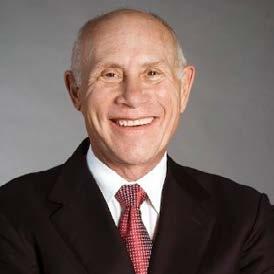
17
Have you or a loved one been impacted by pulmonary fibrosis?
Be a part of the solution! Join the PFF Community Registry.
Enroll in the Community Registry

Are you a researcher interested in using data from the PFF Registry?
Deidentified data from the PFF Registry are available for use by clinical translational investigators in academia and industry. Submit a research proposal
Is your organization interested in supporting the PFF Registry?
The PFF Registry relies on support from partners, foundations and individuals. Become a sponsor














































 SCOTT STASZAK Chief Operating Officer
SCOTT STASZAK Chief Operating Officer


















 Pleasant Valley, New York
Patient with FPF PFF Ambassador
Pleasant Valley, New York
Patient with FPF PFF Ambassador













